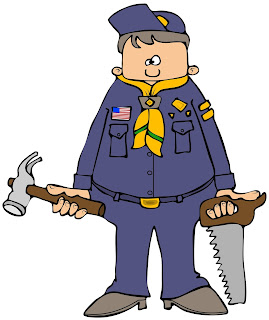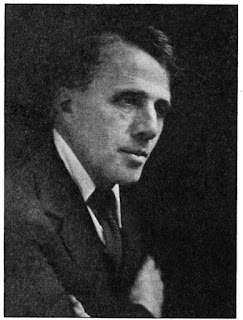 |
| Dr. JJ is a newly minted Cub Scout Den Leader |
I have never wanted to become a Cub Scout Den Leader. In fact, on my lifelong bucket list—which is LONG indeed—being a Cub Scout Den Leader ranks right down near the bottom next to scrubbing mildew in the shower, stubbing my toe, and banging my head against a concrete wall.
This being the case, why on Earth would I accept an invitation to become a Cub Scout Den Leader if I don't have to? It's not like someone is forcing me to take on that added responsibility and duty in my life.
Good Question!
The rejoinder to this interrogatory is the subject of this week's blog post—and the answer is this...
Because I love my kids and it is the RIGHT thing for me to do at this particular time in my life—whether I feel like it or not.
In other words, the answer is: DUTY and LOVE—two words that self-action leaders uphold as a generalized, yet ultimate response to the piercing and perennial existential query: What is the purpose of life? Distilled down to its purest essence, Duty and Love do indeed serve as the most succinct statements articulating the Purpose of our Lives.
We live in a world where duty and love too often take a back-seat to pleasure-seeking, instant gratification, and lust. The problem with these troubling trends is that disaster lurks in the shadows whenever and wherever the devils of our nature overtake the angels thereof.
You don't have to be religious (or even spiritual) to accede this highly practical and common-sense notion. It's just a mathematical reality, especially as judged over time.
 |
| The ultimate goal of education should be to develop good habits and learn to take personal responsibility. |
In articulating this fundamental SAL principle, I echo the inspired words of Thomas Huxley, who once wrote:
"The most valuable result of all education is to make you do the thing you have to do, when it ought to be done, whether you like it or not. It is the first lesson that ought to be learned. And however early a man [or woman's] training begins, it is probably the last lesson that he [or she] learns thoroughly."
— Thomas Huxley
Simply stated, self-action leaders are selfless, responsible, and disciplined people. And not merely because being selfless, responsible, and disciplined are RIGHT things to do. Self-action leaders also practice these virtues because they understand that doing so is the best way of guaranteeing what they want most—which is positive, productive, and personally satisfying results in the LONG-RUN.
In the LONG-RUN I say! (1)
 |
| Self-Action Leaders consistently make decisions by looking way down the road to determine LONG-TERM consequences of those decisions. |
In the LONG-RUN I say! (1)
 |
| Ahhhh! What was I thinking? |
Even more tragically, said persons often end up like the bedeviled soul in the Screwtape Letters (Letter XII), who, at the end of his life tragically laments the cruel irony of his own ill-advised decisions, leading him to transparently confess: "I now see that I spent most of my life doing neither what I ought nor what I liked." (1a)
In other words, for his primal pursuit of pleasure, our hedonistic and otherwise unwise human was rewarded not only an eternal estate among the morally degenerate, but he ironically managed to accrue a mere modicum of pleasure along his journey through this world as well.
If such a deal sounds like a "Catch 22," that's because it is!
How can we as self-action leaders avoid this pathetically sullen, yet surprisingly common (and deeply regrettable) state of being in our own lives?
 |
We all have duties in our lives and careers. What are yours? And are you faithful at attending to them in a conscientious and timely manner? |
To illustrate what this process looks like in real life, consider the following example from my own life...
Since I was just a teenager, I have had a deep-seated desire to travel the world teaching true principles of human thought, speech, and action. I am absolutely obsessed with such things and my greatest and most healthy outlet is to either write and speak or teach on related subjects. Attending this goal is an accompanying desire to be a successful author, leader, organizer, builder, and influential agent of change on a macro scale.
To accomplish these important, life-long desires of mine, I have invested tens of thousands of hours of thought, reading, study, formal education, and practice over the course of more than 30 years. Suffice it to say, I have, for a very long period of time, paid a very high price to become the kind of person who is capable of realizing these deep, penetrating, and authentic desires of my heart.
 |
| 2015 Version of SAL Textbook |
But it was not to be.
In fact, as it turned out, I was not even close!
Despite all my efforts and sacrifices over the years, and regardless of the punctiliousness, persistence, and perspiration involved in my painstaking preparation, I was not about to enter the full-flowering of my career as a speaker, writer, and leader back in 2015.
I was about to become a full-time stay-at-home Dad!
By getting rejected by 70 different colleges and universities for 100 different academic teaching/researching positions all over the world, thus guaranteeing that I would remain a stay-at-home dad for the foreseeable future.
Instead of becoming a bestselling author or entering the college classroom, I began changing diapers and babysitting a one-year old and a three-year old on a full-time basis.I'm not going to lie... that first year of full-time "Daddying" just about killed me, both emotionally and physically—not because it was so incredibly difficult (although it definitely was!) but because it was so fundamentally different from my previous life as a traveling contract trainer. The contrast I experienced moving from the world of being a traveling career professional to becoming a full-time stay-at-home parent was a profound shock to my entire system.
 |
| My three- and one-year old in 2016. |
Part of this easing process involved rounding the learning curve. Gaining knowledge and experience did not change the difficulty-at-hand, but it did change ME, which in-turn made my difficulties less challenging.
"Nothing is really hard or easy. There is only your ability (or lack thereof) to do."
— Dr. JJ
 |
| Sketch of Thoreau's homebuilt cabin near Walden Pond in Massachusetts. |
"Things don't change. We change."
— Thoreau
 |
| With my three kids, aged 6, 4, and <1 in 2019. |
 |
| Ever felt like life itself was singling you out and laughing at YOU? |
 |
| My Great Aunt Dorothy was a "Mover and a Shaker" in part because she knew how to say: "No" |
 |
| A section of Auschwitz-Birkenau prison in Poland where Viktor Frankl suffered, reflected, and achieved extraordinary Existential Growth. |
"What [is] really needed [is] a fundamental change in our attitude[s] toward life. We [all need] to learn ... that it [doesn't] really matter what we expect... from life, but rather what life expect[s]... from us. We need... to stop asking about the meaning of life, and instead to think of ourselves as ... being questioned by life—daily and hourly. Our answer must consist ... of right action and ... right conduct. Life ultimately means taking the responsibility to find the right answer to its problems and to fulfill the tasks which it constantly sets for each individual.
These tasks, and therefore the meaning of life, differ from [person to person] and from moment to moment. ... Life does not mean something vague, but something very real and concrete, just as life's tasks are also very real and concrete. They form [our] destiny, which is different and unique for each individual. No [person] and no destiny can be compared with any other [person] or any other destiny. No situation repeats itself, and each situation calls for a different response. ... Every situation is distinguished by its uniqueness, and there is always only one right answer to the problem posed by the situation at hand." (2)
Throughout my life, LIFE itself has asked me to do a whole host of different things that I felt disinclined to do. In many cases, the prospect of tackling certain tasks and undertakings that, while clearly MY DUTY to perform, nevertheless engendered no small amount of fear and even dread. In those instances, I had a choice to make. Would I humbly and obediently submit myself to life's urgent, important, and compelling requests, or would I shrink away by pridefully and selfishly refusing said opportunities?
 |
| Robert Frost (1874-1963) Poet and author of "The Road Not Taken" |
In the short run, doing one's duty is often difficult and unpleasant. That is an absolutely omnipresent fact of life. But in the long-run, the rewards of doing so are so exorbitantly rich and plentiful that it is hard to believe that anyone in their right mind would ever choose any other pathway, no matter how adverse or challenging.
For example, could there be anything more valuable than the depth and strength of my earned relationships with my wife and children because I have spent so much time serving and loving them since retiring as a contract trainer nearly SIX (6) years ago?
Or what about the positive and productive contribution I made to the lives of the hundreds of students I have influenced over the years? For most people, the answer to these questions are self-evident and therefore rhetorical. And so it is for me as well.
Thus, I have no regrets.
Nevertheless, a lingering question still begs, as follows: Will my hoped-for and envisioned "day-in-the-sun" eventually arrive as a writer and speaker?
Perhaps?
Probably?
Fairly likely?
Almost certainly?
Without any doubt or question?
 |
| I might be envied by a King... Cuz I'm a Family Man |
Nevertheless, even if it doesn't turn out quite that way, I am—and am well positioned to remain—a very rich man.
Why am I rich?
Because I have deep, intimate, and richly satisfying family relationships. And I have the added luxury of being able to lay my head down upon my pillow each night with a clear conscience before God, man, and myself knowing that I have consistently striven to the best of my imperfect ability to faithfully attend to my DUTY while seeking sincerely to LOVE my fellowmen.
No personal or professional opportunity, accomplishment, remuneration, or reward can even begin to rival that kind of residual income-infused GOLDMINE.Whatever my future might bring, I am grateful that I recognize the profound truth that in the end, whatever I may personally want out of my life and career is far less important that what life itself wants out of me on a daily, even hourly basis throughout my life. Thus, in the end, my success will not be measured in books sold, dollars earned, employees hired, or miles traveled. It will be measured in the extent to which I did my duty and strove to do the RIGHT things every day of my life.
And that is what Self-Action Leadership is all about!
 |
| Immanuel Kant 1724-1804 German Philosopher |
In Kant's view, the most valuable and worthy human attribute is not talent, ability, wealth, power, luck, or good looks. The ultimate good for Kant is constituted in what he called a "Good Will" whereby an individual autonomously choose to align one's thoughts, speech, and behaviors with Universal Laws of Right Conduct even—and especially—when we DON'T feel like it. For those who align their conduct with Kantian categorical imperatives, "Joy is [truly] duty and Love is [truly] Law." (4)
In my personal and professional experiences, conscientiously and consistently attending to my DUTY, LOVING my fellowmen, and otherwise doing the RIGHT thing to the best of my imperfect ability—however difficult and time-consuming—is the best way to live in the long run.
Nay; that is too weak. Let's put it a little more strongly: it is the only way to live in the long run. This is because doing so is the only way to obtain the best possible results over time—for oneself and others.
As human beings, we all know "that every[one] is free, to choose his life and what he'll be" (5). This liberty extends to making a wide array of choices that are wrong, foolish, selfish, short-sighted, etc. And in the short-term, said choices may bring about moments of enjoyment or escape. But if we are interested in lasting joy and peace of mind, there is only one pathway that leads thereto. And that pathway is The Road Less Traveled, which is marked by duty, responsibility, and right thinking, speaking, and doing.
THERE IS NO OTHER WAY.
In what ways are you currently being selfish or foolish in your own personal or professional thoughts, speech, or conduct? In what ways are your actions aimed at short-term fun, pleasure, or escape at the expense of long-term achievement, joy, and peace of mind?
What is the current strength of your own Kantian Good Will? Are you in the habit of doing what is right even—and especially—when you don't feel like it, or when doing so is difficult or unpopular? Or are you apt to just give into selfish inclinations or momentary whims—you know, in taking the "easy way out"?
 |
| Doing difficult things brings about a cornucopia of rewards. |
"Easy choices, hard life.
Hard choices, easy life."
— Jerzey Gregorek
I invite you to take some time TODAY to ponder on the unique Purpose of YOUR OWN Life within a framework of the general purpose of all of our lives (Duty & Love). In so doing, I encourage you to be honest with yourself about your current habits of thought, speech, and action. Are these habits helping or hurting you and those you profess to care the most about?
Lastly, what is ONE thing you could begin doing TODAY to start re-charting a better, wiser, and more selfless course for your family, career, and life that will bring about the richest possible rewards in the END?
There's a little buffet of thought for you.
Now get "eating"!
-Dr. JJ
Author's Note: This is the 234th Blog Post Published by Freedom Focused LLC since November 2013.
Click HERE for a compete listing of the other 233 FF Blog Articles.
.........................
Tune in NEXT Wednesday for another article on a Self-Action Leadership related topic.





No comments:
Post a Comment